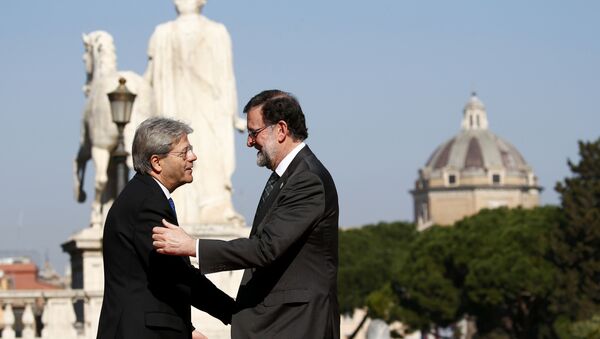The southern EU member states have become increasingly embittered by the northern — and eastern — EU states over the migrant crisis, which has put the burden of arrivals on Mediterranean countries — particularly Greece and Italy.
Madrid acoge la III Cumbre de países del Sur de Europa #UESur. Gran oportunidad para reforzar la unidad y el compromiso con la integración pic.twitter.com/3CUJOIeU54
— Mariano Rajoy Brey (@marianorajoy) April 10, 2017
Ahead of the summit, Rajoy's office said the meeting will be a chance to "launch a message of unity and commitment to the project of European integration at a decisive moment in our history."
"Europe must continue to work to address the issues of greatest concern to its citizens and strengthen its project of integration," the statement said.
The summit comes amid ever-growing dissent within the bloc — exacerbated by the decision by Britain to withdraw its membership of the EU. The long-term struggle has been to agree on a common immigration policy.
En La Moncloa con el presidente de la República de #Chipre, @AnastasiadesCY. Excelentes relaciones bilaterales en el seno de la #UE pic.twitter.com/H3GgUYEy5Y
— Mariano Rajoy Brey (@marianorajoy) April 10, 2017
'Booze and Women' Jibe
The situation was worsened when the President of the Eurogroup — the members of the eurosone single currency area — Jeroen Dijsselbloem gave an interview to a German newspaper in which he suggested that the southern — mainly Mediterranean — Eurozone members, who are struggling to remain within the fiscal rules of the currency, were wasting money.
"During the crisis of the euro, the countries of the north have shown solidarity with the countries affected by the crisis. As a Social Democrat, I attribute exceptional importance to solidarity. [But] you also have obligations. You cannot spend all the money on booze and women and then ask for help," he said.
Divisions grew following the escalation of the migrant crisis in 2015, during which the European Commission proposed moving 160,000 migrants in Greece and Italy around EU member states under a mandatory relocation plan.Hungary, Poland, the Czech Republic and Slovakia have all made it clear that it would continue to oppose the Brussels plan, which has so far seen only 16,000 actually relocated.
Meanwhile, the controversial EU-Turkey migrant deal — to relocate "irregular migrants" — those refused asylum in Greece — back to Turkey, is faltering because of human rights concerns in Turkey since the failed coup of July 2016.
The meeting of the leaders will be the third by the group following gatherings in Athens in September 2016 and Lisbon in January 2017.



